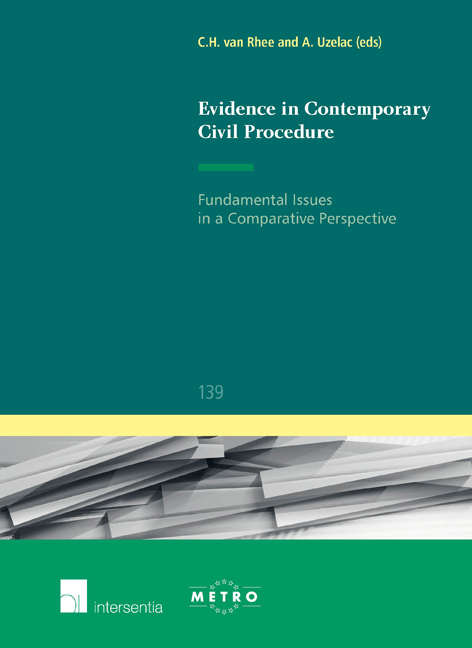Book contents
- Frontmatter
- Contents
- List of Authors
- Acknowledgements
- INTRODUCTION
- FUNDAMENTAL AND OTHER PRINCIPLES OF EVIDENCE IN CIVIL LITIGATION
- EVIDENCE AND THE PRINCIPLE OF PROPORTIONALITY. HOW TO GET RID OF EXPENSIVE AND TIME-CONSUMING EVIDENCE?
- DISCLOSURE OF DOCUMENTS IN CIVIL PROCEDURE: THE PRIVILEGE AGAINST SELFINCRIMINATION OR A QUEST FOR PROCEDURAL FAIRNESS AND SUBSTANTIVE JUSTICE
- PRECLUSION OF LATE ALLEGATIONS AND EVIDENCE AS A TOOL TO INCREASE THE EFFICIENCY OF CIVIL PROCEEDINGS IN POLAND: A SHORT STORY OF THE UGLY PAST AND THE WAY TO A BRIGHT FUTURE
- THE ‘RIGHT TO PROOF’ AND THE ‘LOYALTY PRINCIPLE’: A FRENCH PERSPECTIVE
- RESTRICTIONS ON THE ADMISSIBILITY OF EVIDENCE
- TAKING LENIENCY DOCUMENTS AS EVIDENCE IN DAMAGES ACTIONS IN CASES OF COMPETITION LAW INFRINGEMENT
- LOST IN TRANSLATION? LANGUAGE DIFFERENCES AND THEIR IMPACT ON EVIDENCETAKING IN LITIGATION
- EVIDENCE, INFORMATION TECHNOLOGY AND PRINCIPLES OF CIVIL PROCEDURE – THE HUNGARIAN PERSPECTIVE
- THE POTENTIAL IMPACT OF ELECTRONIC PROCEEDINGS ON TRADITIONAL PRINCIPLES OF CIVIL PROCEDURE – THE SLOVENIAN EXPERIENCE
- TYPES OF EVIDENCE IN CIVIL LITIGATION
- EVIDENCE IN ARBITRATION AND NATIONAL CIVIL LITIGATION
- REGISTRAR
- EVIDENCE IN CROSS BORDER CIVIL LITIGATION
- IUS COMMUNE EUROPAEUM
LOST IN TRANSLATION? LANGUAGE DIFFERENCES AND THEIR IMPACT ON EVIDENCETAKING IN LITIGATION
from FUNDAMENTAL AND OTHER PRINCIPLES OF EVIDENCE IN CIVIL LITIGATION
Published online by Cambridge University Press: 15 December 2017
- Frontmatter
- Contents
- List of Authors
- Acknowledgements
- INTRODUCTION
- FUNDAMENTAL AND OTHER PRINCIPLES OF EVIDENCE IN CIVIL LITIGATION
- EVIDENCE AND THE PRINCIPLE OF PROPORTIONALITY. HOW TO GET RID OF EXPENSIVE AND TIME-CONSUMING EVIDENCE?
- DISCLOSURE OF DOCUMENTS IN CIVIL PROCEDURE: THE PRIVILEGE AGAINST SELFINCRIMINATION OR A QUEST FOR PROCEDURAL FAIRNESS AND SUBSTANTIVE JUSTICE
- PRECLUSION OF LATE ALLEGATIONS AND EVIDENCE AS A TOOL TO INCREASE THE EFFICIENCY OF CIVIL PROCEEDINGS IN POLAND: A SHORT STORY OF THE UGLY PAST AND THE WAY TO A BRIGHT FUTURE
- THE ‘RIGHT TO PROOF’ AND THE ‘LOYALTY PRINCIPLE’: A FRENCH PERSPECTIVE
- RESTRICTIONS ON THE ADMISSIBILITY OF EVIDENCE
- TAKING LENIENCY DOCUMENTS AS EVIDENCE IN DAMAGES ACTIONS IN CASES OF COMPETITION LAW INFRINGEMENT
- LOST IN TRANSLATION? LANGUAGE DIFFERENCES AND THEIR IMPACT ON EVIDENCETAKING IN LITIGATION
- EVIDENCE, INFORMATION TECHNOLOGY AND PRINCIPLES OF CIVIL PROCEDURE – THE HUNGARIAN PERSPECTIVE
- THE POTENTIAL IMPACT OF ELECTRONIC PROCEEDINGS ON TRADITIONAL PRINCIPLES OF CIVIL PROCEDURE – THE SLOVENIAN EXPERIENCE
- TYPES OF EVIDENCE IN CIVIL LITIGATION
- EVIDENCE IN ARBITRATION AND NATIONAL CIVIL LITIGATION
- REGISTRAR
- EVIDENCE IN CROSS BORDER CIVIL LITIGATION
- IUS COMMUNE EUROPAEUM
Summary
Introduction
The idea of addressing the topic of the impact of language differences on litigation was prompted by the reading of the essays collected in a special issue of Erasmus Law Review under the heading ‘Law and Language: Implication for Harmonization and Cross-Border Litigation’. These essays helped me frame some thoughts on the problems that may arise when the dramatis personae of a judicial proceeding do not share the same native language.
Language differences can affect litigation in many ways, and most of all in transnational cases or, to use the preferred expression in the EU context, in crossborder cases. Cross-border litigation implies that at least one party to a case will have to litigate in a foreign language, since the rule is that the court language is the official language of the forum state. Whenever international rules on jurisdiction allow the plaintiff to do some forum shopping, they also allow him to engage in language shopping. Therefore, often the defendant is the one who is faced with language obstacles. It is clear that these obstacles must not harm his right to a fair trial, nor must they contribute to delaying the proceedings.
Language differences may arise at the very beginning of a case (just think of the problems brought about by service of process), but in this contribution I would like to make some remarks on the impact of language differences at the evidencetaking level, that is, with reference to the documents that are produced as evidence, and to oral evidence, namely, witness testimony or the interrogation of the party himself, as regards the legal systems – such as the Italian system – in which the parties cannot be heard as witnesses, but are subject to a particular form of examination that in Italy is qualified as ‘formal interrogatory’.
The Protection of Language Rights
The problem of language differences and their impact on litigation and on the rights of the parties can be dealt with from different angles. One is to see the problem within the framework of so-called language rights. Scholars have emphasized that ‘the concept of language rights is in an embryonic stage only’, and, as a matter of fact, it is difficult to offer a clear definition of what is meant exactly by ‘language rights’, if one steps back from the perspective in which they are often analysed, namely, the protection of minority languages.
- Type
- Chapter
- Information
- Evidence in Contemporary Civil ProcedureFundamental Issues in a Comparative Perspective, pp. 125 - 136Publisher: IntersentiaPrint publication year: 2015



